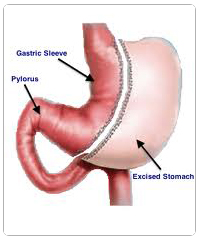+91 79 26466002, 9099197473
Laparoscopic Sleeve Gastrectomy
Laparoscopic Sleeve gastrectomy (LSG) is gradually becoming the new gold standard for Bariatric surgery. It is the restrictive part of the more extensive mixed restrictive and malabsorptive operation, gastric bypass and duodenal switch (GB/DS). It generates weight loss by restricting the amount of food that can be eaten without any bypass of the intestines or malabsorption. With this procedure, the surgeon removes approximately 85 percent of the stomach laparoscopically so that the stomach takes the shape of a tube or "sleeve."
Because the modified stomach continues to function normally there are fewer restrictions on the types of foods which patients can consume after surgery. The quantity of food the patient can consume is greatly reduced. This is seen by many patients as being one of the benefits of the laparoscopic sleeve gastrectomy, as is the fact that the removal of the majority of the stomach also results in the virtual elimination of hormones (ghrenlin) produced within the stomach which stimulates hunger.
The nerves to the stomach and the outlet valve (pylorus) remain intact with the idea of preserving the functions of the stomach while reducing the volume. Note that there is no intestinal bypass or malabsorption with this procedure, only stomach reduction.
Benefits
- No foreign body is used as in the adjustable gastric banding and thus no adjustment is required.
- If weight loss is inadequate, the patient has the option to have the second stage of the operation (gastric bypass or the duodenal switch).
- It does not involve any bypass of the intestinal tract and thus patients aviod the complications of intestinal bypass such as intestinal obstruction, anemia, osteoporosis, vitamin deficiency and protein deficiency.
- It also makes it a suitable form of surgery for patients who are already suffering from anemia, Crohn's disease and a variety of other conditions that would place them at high risk for surgery involving intestinal bypass.
- It is one of the few forms of surgery which can be performed laparoscopically in patients who are super obese.
- Better quality of life with less late complications as compaired to gastric banding.
Risks
- The procedure requires stapling of the stomach and therefore leakage and of other complications directly related to stapling may occur.
- Patients who are super obese usually require second stage operations in order to lose the rest of the excess weight if their BMI remains larger than 45, although two stages may ultimately be safer and more effective than one operation for super obese patients.

